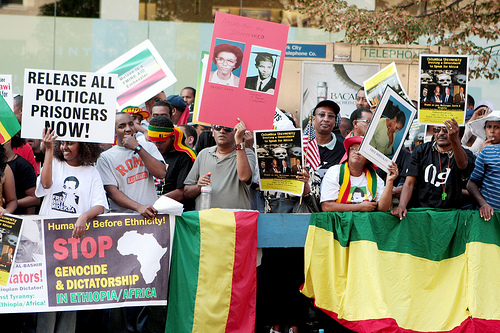Ethiopia: Home, Bitter Prison
by Mesfin Negash / July 27, 2012 / 1 Comment
The struggle to make Ethiopia a“home, sweet home” for all

A protest calling for the release of Ethiopian political prisoners. Photo: flickr user Mira (on the wall). Creative Commons.
I have been officially convicted and sentenced to an eight-year prison term by a kangaroo court in Ethiopia. My fictitious crime is “giving professional support” to a “terrorist organisation.” Five other journalists who were convicted in the same case, one of them a colleague of mine at Addis Neger, have been handed terms from eight years to life imprisonment. Earlier this year five other journalists (three Ethiopians and two Swedes) were also sentenced on “terrorism related” charges. In Ethiopia neither the charges nor the sentences are conducted with due process or under an independent judiciary. Therefore, apart from those already languishing in prison, the sentences carry no practical consequences for the professional freedom of those “convicted” living in exile.

- Why does a country with her own unique alphabet and long history of writing persist to deny citizens the right to freedom of expression in this era of Expression? No other country in Africa may typify this paradox more than Ethiopia. As Leopold Senghor’s famous collection of poems entitled “Ethiopiques” remained ‘powerful and popula’ so does the source of his intriguing title, Ethiopia, in her own ways. In “Ethiopiques,” I share Ethiopian views on pertinent issues related to journalism, culture and, of course, the overarching subject of politics.

- Mesfin Negash is an Ethiopian journalist living in exile in Sweden. He is one of the journalists accused of “terrorism” in 2011 by the Ethiopian government. The co-founder and first editor-in-chief of an acclaimed Ethiopian newspaper, Addis Neger, he is currently the Managing Editor of Addisnegeronline.com. He is a political science student by training and known for his critical commentaries on significant political and social issues.
Such politically motivated charges and court drama are not news in Ethiopia. The sentencing is only a personal reminder about where my country is heading. Now Ethiopia can’t be my “home, sweet home” until the current regime loses power or genuine democratic reform is introduced. Additionally, the country is becoming “home, bitter prison” for the majority of Ethiopians, both at home and abroad. Home, bitter home.
Ethiopia will always be my home for the simple fact that I was born, raised, and will die as an Ethiopian. This cannot be altered for any reason. Ethiopia was also “sweet” for me and many of my compatriots because it contained our mixed feelings: Hope and despair, success and failure, grace and disgrace, pride and shame, history and future. We had hope and the belief that we could build a better country: a country that feeds its people, respects basic rights, and bows to the spirit of freedom and equality. My home was sweet not because it was perfect, nor because the good outweighed the bad as I envisioned. It was sweet because I believed our hope for democracy, freedom, justice, and prosperity would gradually win. This conviction was focused on making Ethiopia a better home than the one I inherited. Now Ethiopia is “home, bitter prison.” It is still home, as it was since the beginning, but it is “bitter” because many are losing their hope for change. Indeed it is bitter when the public is denied basic rights, when hope for genuine reform is dashed, and when the tyranny of oligarchs becomes the law of the land. It cannot be sweet when the government works hard to alienate justice, equality, mutual respect, and trust. It is painful to see young men and women lose hope in their country’s political future.
But Ethiopia is not just bitter when hope and courage are criminalized by the ruling elite: Those who dare to speak out for democratic reform become victims of Ethiopia’s unabated one-man power. Anyone, Ethiopian or not, who supports the democratic hope of the nation in any manner is considered an enemy of the state, or a “terrorist” as the new fashion has it. All of them end up silenced or in prison. Ethiopia is a prison under the guardianship of PM Meles Zenawi.
For some, the struggle now becomes finding hope in a bitter state of affairs. Though it will take considerable time and effort, the struggle to make Ethiopia a “home, sweet home” for all will succeed. No nation deserves to be a bitter prison, and history stands against the repressive, manipulative, and wasteful status quo that dictators want to perpetuate. As Nelson Mandela once said “there is no easy walk to freedom.”





One Comment on "Ethiopia: Home, Bitter Prison"
What a great day for me Ones again to read your thoughtful, wise and well written article.. I was one of the many readers of your lovely Addis neger and all kinds of columns written by Bewketu, Daniel Mohammed,,Negri (?0 and others too. Well, I don,t know but people of the former Addis nger came to my mind as a snapshot and started to nagate in the internet, starting with Bewketu,daniel and you, Mesfin.and all of a sudden you are there man. Am very great full to read your article on line and more from your broad and smart mind. Keep up1 It is because of our expectations and Hope that we sustain in this beautiful and sweet home land of ours ETHIOPIA.And I pray for all of you there Not to give up and Live with your great expectations and Hopes. Wishing you all the best, From Adigrat